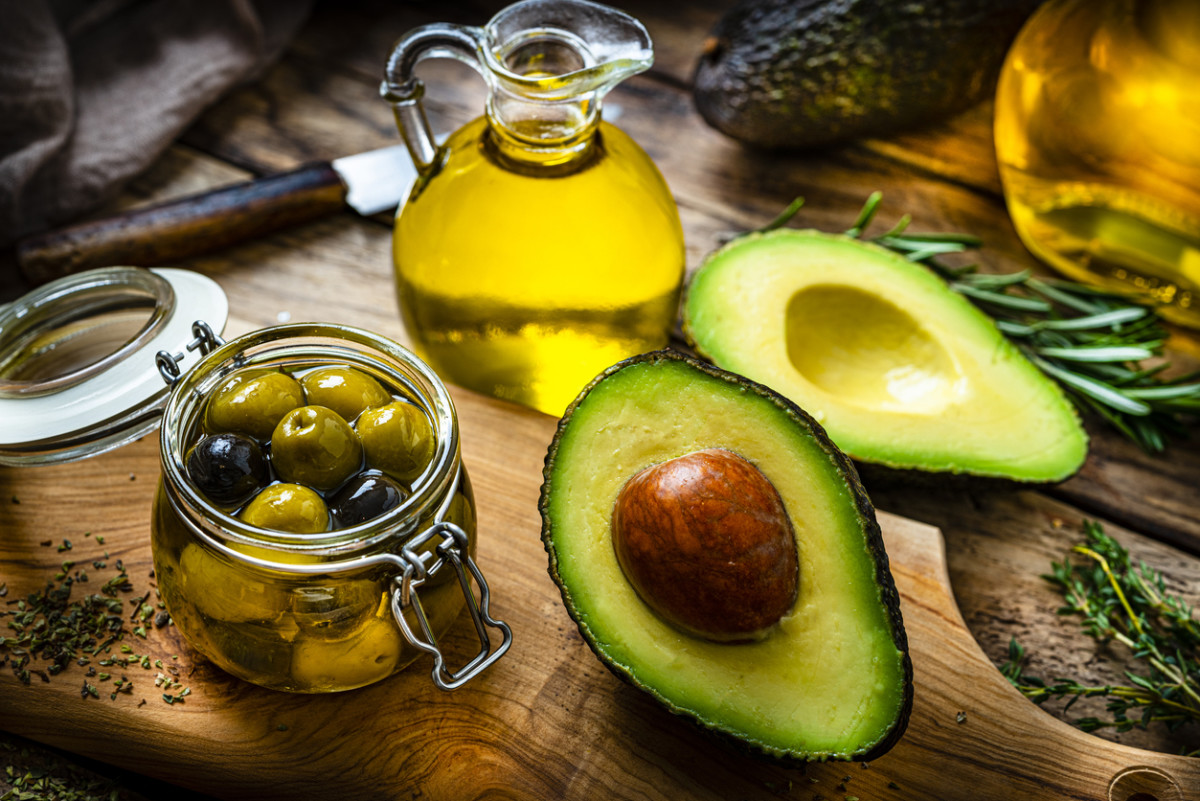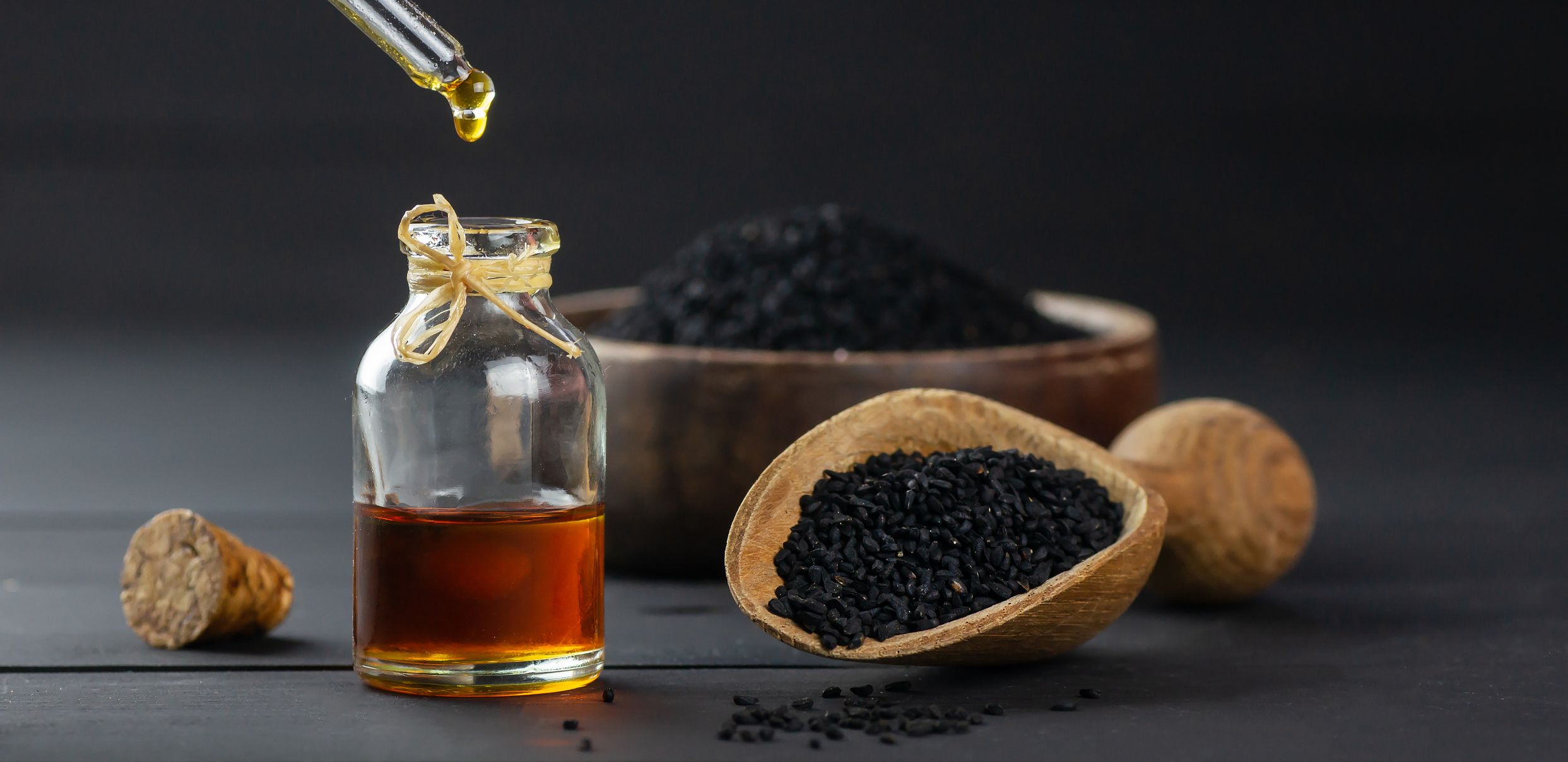Olive oil and avocado oil can provide you significant health benefits and you can use them in several culinary applications. Whether you’re looking for the strong flavors of olive oil or the multipurpose cooking properties of avocado oil, adding these oils to your diet can enhance both your meals and your overall health.
Olive oil, especially, extra-virgin olive oil, is known for its strong flavor and, it is mostly used in dips, salad dressings, and other dishes.
On the contrary, avocado oil is popular for its neutral and mild, flavor, commonly used for roasting, sautéing, and grilling, as it has high smoke point. In this article, we will offer all the facts about avocado and olive oil. The nutrient value comparison, their similar benefits, and how they are different from each other.
Read More: How to Make and Use Castor Oil Pack
Avocado Oil and Its Nutritional Facts
Avocado oil is obtained by compressing the avocado fruit after the cavity and skin have been removed. The resulting pulp is then heated and filtered to obtain the oil. When labeled as “cold-pressed” or “cold-extracted,” the oil has been produced without the use of heat or chemical solvents, preserving more nutrients. Cold-pressed avocado oil retains higher levels of nutrients since no heat is involved, which can otherwise reduce its nutritional value. Avocado oil has a high amount of antioxidants and healthy unsaturated fats.
The nutritional facts of 1 tablespoon of avocado oil are
- Total fats: 14 gm
- Protein: 0 gm
- Fiber: 0 gm
- Calories: 124 gm
- Saturated fat: 1.6 gm
Olive Oil and Its Nutritional Facts
The olive oil extraction process is similar to the extraction of avocado oil but the difference is that when making olive oil the olives ho through multiple separation and pressing processes, while the seed and skin of the avocado are removed before pressing. Olives are compressed to turn into a pulp and then filtered and heated to extract their oils. Sometimes oil can then be further processed with chemicals and even make fragrant to refine the look and flavor of the oil. However, cold-extracted or cold-pressed oils are available, but they can gain more nutrients when heated.
Virgin and Extra Virgin Olive Oil
Extra-virgin olive oil is typically, processed less while virgin olive oil is processed more. Extra-virgin olive oil has a stronger flavor and is likely to retain most of its nutrients.
Here are the nutritional facts of olive oil in 1 tablespoon quantity
- Total fat: 12 gm
- Saturated fat: 2.5 gm
- Calories: 120 gm
- Fiber: 0 gm
- Sodium: 0 gm
- Protein: 0 gm
Common Facts of Avocado Oil and Olive Oil
Avocado oil and olive oil share several facts such as
Both Support Your Heart’s Health
As we mentioned above both oils have a high amount of unsaturated fatty acids. They share similar amounts of unsaturated fats compared to saturated fats. This ratio of fats made avocado and olive oil a good choice to minimize the risks of heart disease and other chronic diseases.
Furthermore, both oils support your heart health because if you add these oils to your diet they lower blood pressure and LDL cholesterol. So they are a good choice for heart patients.
Both Support Your Eye Health
Avocado and olive oil both have the ability to support your eye health due to having lutein. Lutein is an antioxidant and also acts as an anti-inflammatory, which can help you prevent age-related macular disease associated with vision impairment and blindness.
You can increase lutein intake by sprinkling avocado or olive oil on cooked squash, eggs, or leafy greens.
Both May Support Your Gut
Several studies suggest that extra virgin olive oil maintains brain health also good for gut health. The basic concept of this phenomenon is that avocado and olive oil increase the amount of beneficial bacteria in your gut. So if you add these significant oils to your daily diet automatically your gut health will improve.
Both May be Good for Brain Health
Health experts suggest that regular use of avocado or olive oil may support your brain health. It is- because both oils have antioxidants and unsaturated fat. Another research claims that regular use of extra virgin oil may prevent the progression of Alzheimer’s disease. The same phenomenon occurs with avocado oil.
Consuming Avocado and Olive Oil may Decrease Inflammation
Antioxidants in both oils are associated with lowering or preventing chronic inflammation. Because chronic inflammation may lead to some types of cancers.
Dissimilar Facts about Avocado and Olive Oil
S avocado and olive oil share the same facts, however they also the some dissimilar properties such as
Avocado Oil has elevated Smoke Point than Olive Oil
Avocado oil is better for high-temperature cooking like sautéing, roasting, and baking due to its higher smoke point (482℉) compared to olive oil (376℉). However, Olive oil has more vitamin E, which promotes skin health.
Avocado Oil has a More Neutral Taste Compare to Olive Oil
Avocado oil has a mold flavor, while olive oil can be bolder. Both oils are rich in nutrition, but they should be used in temperance. Storing them in dark glass bottles away from heat and light preserves their quality. Ultimately, the choice depends on your cooking requirements and taste preference.
Olive Oil Contains more Vitamin E than Avocado Oil
Both oils have the antioxidant vitamin E, but olive oil has a bit more than avocado oil. Vitamin E is particularly good for skin health, as it helps protect against UV damage. Aside from this difference, the nutritional content of the two oils is quite similar.
Tips for Using Avocado Oil and Olive Oil
Moderation is Key
While both oils are nutritious and flavorful, it’s important to use them in moderation. According to Perez, the benefits of these oils can also be found in larger amounts in fruits, vegetables, nuts, and seeds, which provide additional nutrients like protein and fiber that oils do not.
Proper Storage
When purchasing olive oil or avocado, choose one in a dark, glass bottle. It helps protect and preserve the oil better than plastic. Keep the oil in a dark, cool place away from direct heat and sunlight to maintain its nutritional quality.
Conclusion
Both avocado oil and olive oil are packed with nutrients and offer similar health benefits, so there isn’t a clear winner in terms of health impact. The decision between the two comes down to your personal preference and what you’re preparing. Additionally, its mild, neutral flavor won’t overpower your dish. On the other hand, olive oil’s richer, more robust taste can enhance the flavor of your food, especially in salads or drizzled over vegetables.
Given their versatility and health benefits, keeping both oils in your pantry is a good choice. Each oil has its own strengths, and having both on hand allows you to choose the best option for each dish. Rather than favoring one over the other, enjoy the unique advantages of each by incorporating both into your cooking routine.
For More Health Info: Health Based Solution








